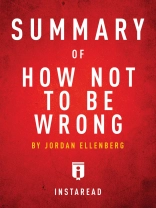Summary of How Not To Be Wrong: by Jordan Ellenberg | Includes Analysis
Preview:
How Not to Be Wrong by Jordan Ellenberg attempts to demonstrate real-life applications of mathematics. In schools, students learn math principles in abstract contexts. Math in the real world is used to make accurate predictions, measure impact, evaluate the best choice when a trade-off is needed, and gauge complicated facts. Mathematical understanding gives individuals the ability to determine when unsound logic has been used to arrive at a factually inaccurate conclusion, and how to correct that logic in order “not to be wrong.”
Inferences require a strong understanding of the implications of certain mathematical tools. Linear projections are one common pitfall: observations tend to regress back to the mean of a set of observations, but people tend to draw linear conclusions even when a curve better describes and predicts the data.
Observed data can also be manipulated because there is always a chance that false positives will give the impression of an effect where none exists…
PLEASE NOTE: This is key takeaways and analysis of the book and NOT the original book.
Inside this Instaread Summary of How Not To Be Wrong:
· Overview of the Book
· Important People
· Key Takeaways
· Analysis of Key Takeaways
About the Author
With Instaread, you can get the key takeaways, summary and analysis of a book in 15 minutes. We read every chapter, identify the key takeaways and analyze them for your convenience.












